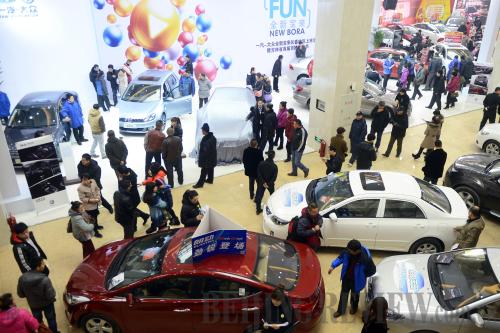|
 |
|
BOOMING CAR MARKET: Local buyers select cars at an automobile exhibition in Changchun, northeast China's Jilin Province, on December 15, 2012 (LIN HONG) |

Accurately analyzing and predicting China's economic development has earned me a living, and opened innumerable doors, for more than 20 years. It also brought the satisfaction of seeing individual interest and skills linked to the world's biggest story—the growth of China's economy and its "national revival."
My relationship with China started unusually as I analyzed its economy for more than 20 years before I could make a visit. The interest started in the 1980s when, for theoretical economic reasons, I concluded its economic reforms, launched by Deng Xiaoping, should achieve great economic success. Nevertheless, for a long time China remained unfashionable—not today's front page news. Soon after I began following the country, the most widely held international theory was that it would be a relative economic failure while real economic progress would be in Eastern Europe and Russia where Gorbachev introduced reforms and rapid privatization began.
As these economic analyses were inaccurate in 1992, I wrote an article that changed my life. Its title, Why the Economic Reform Succeeded in China and Will Fail in Russia and Eastern Europe, explains itself—it analyzed why China's economic path would produce great success, and Russia and Eastern Europe would fail in comparison.
Publication of this in Russia created a sensation. I predicted inflation in thousands of percent, accompanied by industrial collapse, but China's economy growing rapidly. This led to public debates with Russia's Vice President, the President's Chief Economic Adviser, meetings with Russia's Foreign Minister, TV appearances, contracts with multinational companies, etc. At the beginning of 1992 this analysis was received with widespread skepticism, and by year-end its predictions were already confirmed for both China and Russia. Nevertheless, despite publishing analysis based on China's economy, I had no direct contact with the country at all—the work was written from the point of view of theoretical economics.
Nor was I able to visit China for a prolonged period. In 2000 a client, Ken Livingstone, was elected London's mayor. He invited me to take charge of London's economic policy. Only in 2005 was I finally able to visit China—a country whose economy I had been analyzing for decades!
When London's mayor changed in 2008 I knew China's economic success would continue, so I wanted to continue relations with it. I became a visiting professor at Shanghai Jiao Tong University combining a minimum six months a year living in China with continuing visits to India and Russia and a London base.
Living in China naturally gave me far more knowledge of the country, but as the analysis formed two decades earlier had stood the test of time this deepened, but did not fundamentally change my analysis of the country's economy.
|
